Merchant of Venice Act 1, Scene 2 Modern English Translation Meaning Annotations – ICSE Class 10 & 9 English
EnglishMathsPhysicsChemistryBiology
ICSE SolutionsSelina ICSE SolutionsML Aggarwal Solutions
Original Text
Act I Scene II
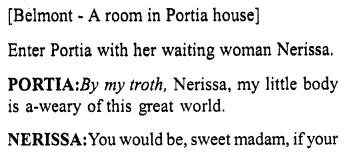
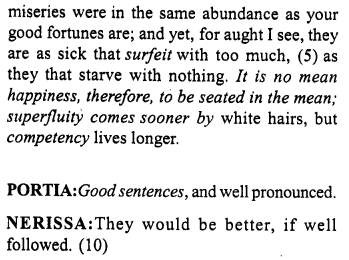
Modern English Reading
Act I Scene II
PORTIA : Honestly, Nerissa, my little body is weary of this great world.
NERISSA : You would be, sweet madam, if your miseries were as abundantas your good fortunes are; and yet, for all I see, they that are sick from over-eating are as sick as those that starve with nothing. It’s not an insignificant happiness, therefore, to be well situated in regard to financial resources: having more than enough comesat some time or other to old men, but having a sufficient income lasts longer.
PORTIA : Good sentences, and well said.
NERISSA : They would be better sentences, if you followed them well.
Word Meaning With Annotation
By my troth : A mild form of oath, surfeit : to be supplied with anything to excess, it is no mean happiness, therefore, to be seated in the mean : Nerissa says, “It is no small happiness to be situated in a position mid-way between poverty and riches.” superfluity : the man who lives wastefully through excess of luxuries, comes sooner by : obtains more quickly, competency : the man who possesses just sufficient for a reasonably comfortable life, good sentences : fine opinions.
Original Text
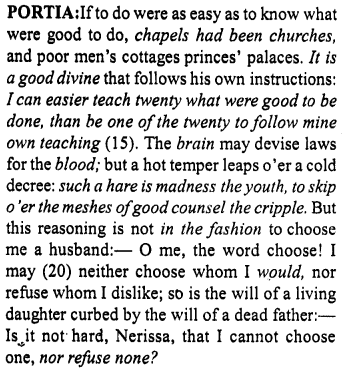
Modern English Reading
PORTIA : If knowing what to do were as easy as knowing what was good to do, chapels would have been churches, and poor men’s cottages would have been princes’ palaces. It is a good prophet that follows his own instructions; It’s easier for me to teach twenty people what was good to do than to be one of that twenty and follow my own teaching. The brain may come up with laws to control society, but one hot temper jumps over a cold law; Madness the Youth is just such a jumper,: skipping over the nets of Good Advice the Cripple. But thinking this way is not the way to choose a husband for me. Oh, me, the word “choose!” I cannot choose someone I like or refuse someone I dislike; so is the behavior of a living daughter curbed by the will of a dead father. Isn’t it hard, Nerissa, that I cannot choose one or refuse none?
Word Meaning With Annotation
Chapels had been churches : a chapel is a church, which accommodates a small number of worshippers. Portia says that if it were as easy to follow out the moral ideal as it is merely to know about it, then there would be so many worshippers that all the small chapels would have to be replaced by big churches. It is a good divine : he is a good preacher. I can easier teach twenty what were good to be done, than be one of the twenty to follow mine own teaching : the general sense of the lines is that to obey instructions is twenty times more difficult than it is to give good instructions, brain : the reasoning powers; the mind, blood : passion; the desires of the body, such a hare is madness the youth, to skip o’er the meshes of good counsel the cripple : here madness typifies a reckless young man, while wisdom typifies an old man. The youth is as agile and active as a hare, while the old man is as feeble and slow as a lame man (cripple), in the fashion : of the proper type, would : would like; care for. nor refuse none : an example of Shakespeare’s double negative, which is used as being stronger than a single negative. We should expect “nor refuse one.’’
Original Text
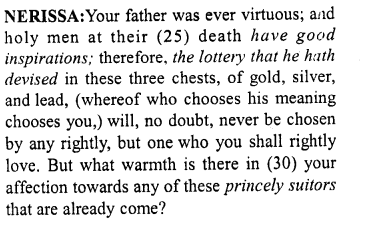
Modern English Reading
NERISSA : Your father was always a holy man, and holy men have good ideas when they die; so the lottery that he has thought up in these three chests, made of gold, of silver, and of lead, by means of which who ever chooses the right chest chooses you, will, no doubt, never be chosen by the right man except the one you shall rightly love. But what warmth is there in your affections towards any of these princes that have already come to try?
Word Meaning With Annotation
Have good inspirations : receive divine guidance, the lottery that he hath devised : “lottery” signifies the winning of a prize by drawing numbers or chances at random. The belief in olden times was that such a method was not decided by chance, but was directed by divine guidance and intervention, princely suitors : It has been thought that there is a topical reference in the mention of the “princely suitors” for the hand of Portia.
Original Text
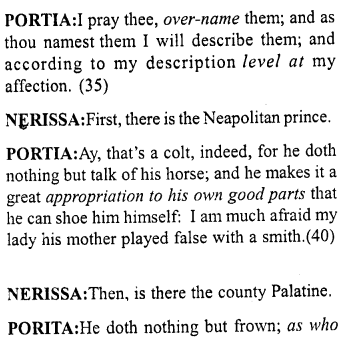
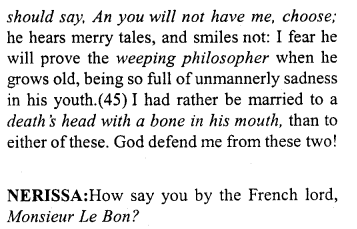
Modern English Reading
PORTIA : Please say their names again, and, as you name them, i’ll describe them; and, according to my description, you can figureout how I feel about them.
NERISSA : First, there is the Neapolitan prince.
PORTIA : Yes, he’s a cunning fellow indeed, because he doesn’t do a thing but talk about his horse; and he makes it a great attribute to his own good qualities that he can shoe him himself, I am very afraid, my lady, his mother had an affair with a blacksmith.
NERISSA : Then there is the Count Palatine.
PORTIA : He doesn’t do a thing but frown, as someone would say, “If you will not have me, choose.” He hears happy tales and doesn’t smile: I’m afraid he will probably be the weeping philosopher when he grows old, being so full of rude sadness in his youth. I would rather be married to a skull with a bone in his mouth than to either of these princes. God defend me from these two!
NERISSA : What do you have to say about the French lord, Monsieur Le Bon?
Word Meaning With Annotation
Over-name : name them over; read over their names, level at : conjecture; arrive at. appropriation to his own good parts : addition to his own merits, county Palatine : The count from Palatine, as who should say : just as if he were saying, an you will not have me, choose : Palatinate has an abrupt manner which infers, “If you do not want me, you can do whatever you like. I don’t care.” weeping philosopher : the old Greek philosopher, Heracleitos of Ephesus, who “wept at everything in the world.” death’s head with a bone in his mouth : the emblem of a skull with two bones crossed underneath was usually known as a “death’s head.” Portia speaks of a different type, of a grinning skull with a bone in its mouth, just as if it were smoking a pipe, monsieur Le Bon : The description which Portia gives of this character is a satire on the traditional, affected, vivacious Frenchman.
Original Text
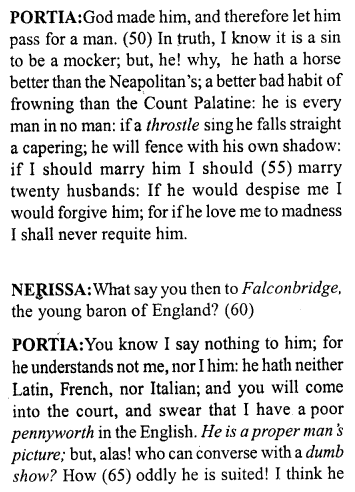

Modern English Reading
PORTIA : God made him, and so let him pass for a man. Intruth, I know it is a sin to be a mocker, but him! Why, he has ahorse better than the Neapolitan’s, a better bad habit off rowning than the Count Palatine; he is every man in no man. If athrush sings, he starts dancing right away; he will fence with his own shadow; if I should refuse him, I would be refusing twenty husbands. If he would only despise me, I would forgive him, because if he loves me like crazy, I’ll never be able to return such love.
NERISSA : What do you say then about Falconbridge, the young baron of England?
PORTIA : You know I say nothing to him, because he doesn’t understand me, and I don’t understand him: He doesn’t know Latin, French, or Italian, and you will come into the court and swear that I only know a penny’s worth of English. He’s the picture of a proper man, but alas, who can talk with someone who can’t talk? How oddly he is dressed! I think he bought his shirt in Italy, his hose in France, his hatin Germany, and his behavior everywhere.
Word Meaning With Annotation
Throstle : name often applied to the common English bird, the thrush, falconbridge : the young English baron, is a good-humoured satire on the typical travelled Englishman of that time, pennyworth : very little knowledge, he is a proper man’s picture : he is certainly a man of fine appearance, dumb show : knowing no French, the young man had to converse by means of signs, his behaviour every where : he had acquired certain manners and customs from all the nations which he had visited.
Original Text
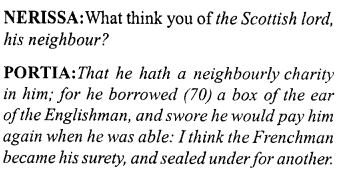
Modern English Reading
NERISSA : What do you think about the Scottish lord, his neighbor?
PORTIA : I think that he has neighborly charity in him, because he borroweda money box from the Englishman, and swore he would pay him again when he was able; I think the Frenchman became his guarantor and it was sealed by another.
Word Meaning With Annotation
The Scottish lord, his neighbour : King James I of Scotland had then ascended the throne of Great Britain, and it was thought advisable to change this lest it should give offence to the King, that he hath a neighbourly charity in him; for he borrowed a box of the ear of the Englishman, and swore he would pay him again when he was able: I think the Frenchman became his surety, and sealed under for another : there was great jealousy between Scotland and England at this period, owing to the long wars and numerous causes of quarrel between the two countries. In order to please his audience, Shakespeare makes the Scotsman and Frenchman both deficient in courage, submitting to a blow from the Englishman without having the spirit to return it. The Frenchman became his surety: the Frenchman gave an assurance that the Scotsman would pay back the blow he had received, and sealed under for another : the language is such as would be used to describe the drawing up of an agreement between two countries. The actual document would contain the seal (in wax) of Scotland, while the French seal would also be placed under it.
Original Text
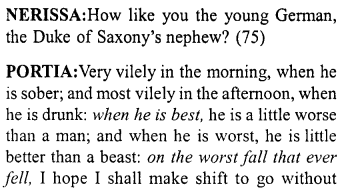
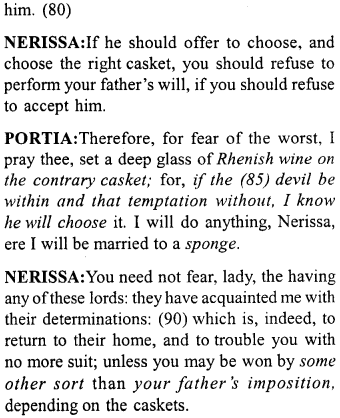
Modern English Reading
NERISSA : How do you like the young German, the Duke of Saxony’s nephew?
PORTIA : Very disgusting in the morning when he is sober, and most disgusting in the afternoon when he is drunk: when he is best, he isa little worse than a man, and when he is worst, he is little better than a beast. If the worst that could happen happens, I hope I’llbe able to go on without him.
NERISSA : If he offers to choose, and chooses the right chest, you would be refusing to perform your father’s will, if your efused to accept him.
PORTIA : So, for fear of the worst, please set a deep glass of Rhenish wine on the wrong chest; because if the devil were within the chest and that temptation on top of it, I know he will choose it. I will do anything, Nerissa, before I’ll be married to a sponge.
NERISSA : You don’t need to be afraid, lady, of having any of these lords; they have told me their intentions, which is indeed to go back to their homes, and to trouble you with no more suits, unless you may be won by some other way than your father’s command, that getting you depends on the chests.
Word Meaning With Annotation
When he is best : he is at his best, on the worst fall that ever fell : even the worst stroke of fortune that may befall me, I hope, will not be so bad that I cannot manage to get rid of him. Rhenish wine : wine made from grapes grown in the Rhine valley, on the contrary casket : on the wrong casket: the one which is opposite to the right one. if the devil be within and that temptation without, I know he will choose : for even if that casket contained the devil himself, he would risk opening it as long as there was such a strong temptation as a flask of wine outside, sponge : used to denote a drunkard, i.e., one who soaks up or absorbs liquor, some other sort : by some different method, your father’s imposition : the conditions imposed by your father.
Original Text
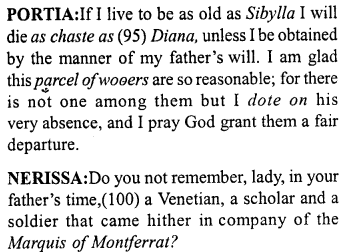
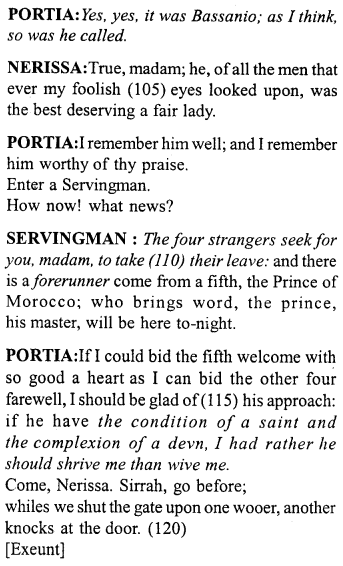
Modern English Reading
PORTIA : If I live to be as old as Sibylla the witch, I’ll die as pure as Diana the goddess of purity, unless I am obtained by the letter of my father’s will.I am glad this batch of would be husbands are so reasonable; because there isn’tone of them that I am not foolishly in love with his very absence, and I pray God grant them a fair departure.
NERISSA : Don’t you not remember, lady, in your father’s time, a Venetian, ascholar and a soldier, that came here in the company of the Marquis of Montserrat?
PORTIA : Yes, yes, it was Bassanio, I think, or so he was called.
NERISSA : True, madam; he, that, of all the men that I have ever seen with my foolish eyes, was the most deserving of a beautiful lady.
PORTIA : I remember him well, and I remember him worthy of your praise.How is it now! What’s the news?
SERVINGMAN : The four strangers are looking for you, madam, to say their goodbyes,and there is a messenger come from a fifth, the Prince of Morocco, who brings word the Prince, his master, will be here tonight.
PORTIA : If I could welcome the fifth with as good a heart as I can bid the other four goodbye, I would be happy of his arrival; if he has the condition of a saint and the complexion of a devil, I would rather he heard my confession than marry me. Come, Nerissa. Servant, go ahead of me. While we shut the gate on one would-be husband, another knocks at the door. [Exeunt]
Word Meaning With Annotation
Sibylla : this refers to Deiphobe, the traditional old woman of the ancient Romans. Apollo promised her that she would live as many years as there were grains in a handful of sand which she carried, as chaste as Diana : the classical goddess Diana is always used as typical of chastity. She was the goddess of hunting, and also of the moon, parcel of wooers : crowd of suitors, dote on : long for. marquis of Montferrat: this was the title of a high-bom Italian nobleman, who would possibly be known by this name in England, yes, yes, it was Bassanio; as I think, so was he called : it will be observed that Portia’s interest is awakened at once by the mention of Bassanio. Her manner here should be compared with the attitude of satire and mockery with which she heard of the other suitors. Shakespeare shows her as already in love with Bassanio. the four strangers seek for you, madam, to take their leave : we have already been told of six suitors staying at Belmont, and it is strange that only four are mentioned here. The most probable explanation is that two of the six were added to the play at a later date, and this line was not altered to correspond with the change, forerunner : one who runs before to announce the coming of his master, the condition of a saint and the complexion of a devn : a saintly character combined with a black colour. The Elizabethans were accustomed rather to seeing negro people than Moors, and the black skin of the pure negro was by no means admired. I had rather he should shrive me than wive me : I would rather have him as my priest, to administer spiritual comfort, than as a husband.
For More Resources